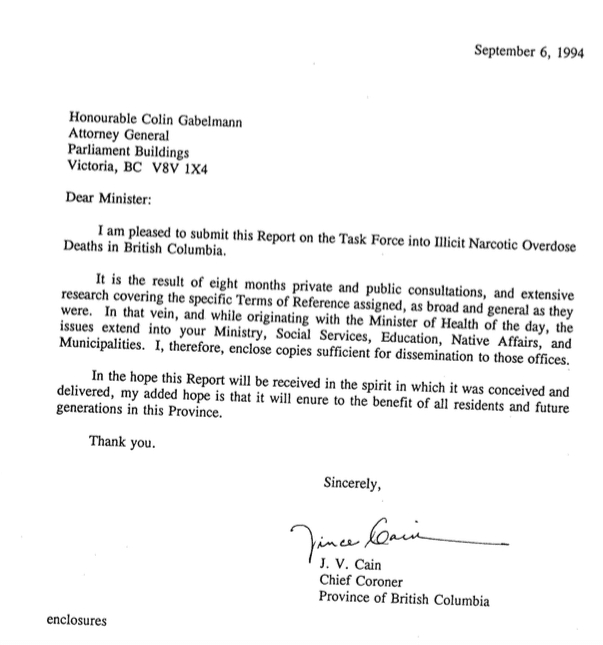Former BC Chief Coroner Vince Cain, in his report on British Colombia’s opioid overdose catastrophe in the nineties, conducted a thorough analysis of the problem we were facing then. Among other things he was very clear that the overdose problem needed public health and social responses, not criminal justice responses and that drug policies needed to be reviewed. He even called for a commission to do the work. Twenty-two years later we are still waiting for that review. Read his report and weep. Weep for the lives lost to the continuing failure to radically change our approach to drugs in this country. We must stop criminalizing people who use drugs and work towards regulating all psychoactive substances in the name of consumer protection. To do otherwise is clearly to repeat the disasters of the past.
Here is his prescient report released in 1994 that called for decriminalization and clinical prescribing of heroin so help stem the overdose crisis.
Excerpt:
“By far the most controversial part of the report will be Chapter VIII, on Legalization and Decriminalization. Legalization is a huge issue which, while the drug problem is largely here, does not have a unique British Columbian solution. It is bigger than Canada, indeed bigger than North America. It is international in scope and in law. Canadian laws and United Nations conventions control this matter, but that ought not detract from the reality of the situation in British Columbia. We have the problem, and we must do what we can about it, now. Consequently, I am recommending the establishment of a commission to examine and challenge those legal aspects of the problem, amongst so many other things. The problem must be looked at with regard to not only the aspect of deaths form heroin and cocaine, but rather the entire smorgasbord of available illicit narcotics, both so-called “soft” and “hard” drugs.
Simultaneously, I am recommending the decriminalization of simple possession of specific “soft and “hard” drugs, the specificity to be left to the experts on that commission. We have a serious problem and I submit that those directly affected ought to be dealt with through a medical model, not a criminal model, even to the point where I am suggesting the possibility of providing heroin to seriously addicted people, in a para-medical model. One material reason for this would be to reduce the demand from the street trafficker, replacing it through the clinic, not unlike the current situation with methadone.”
Page VI – Report of the Task Force into Illicit and Narcotic Overdose Deaths in British Columbia – Office of the Chief of Coroner
(seulement en anglais)

